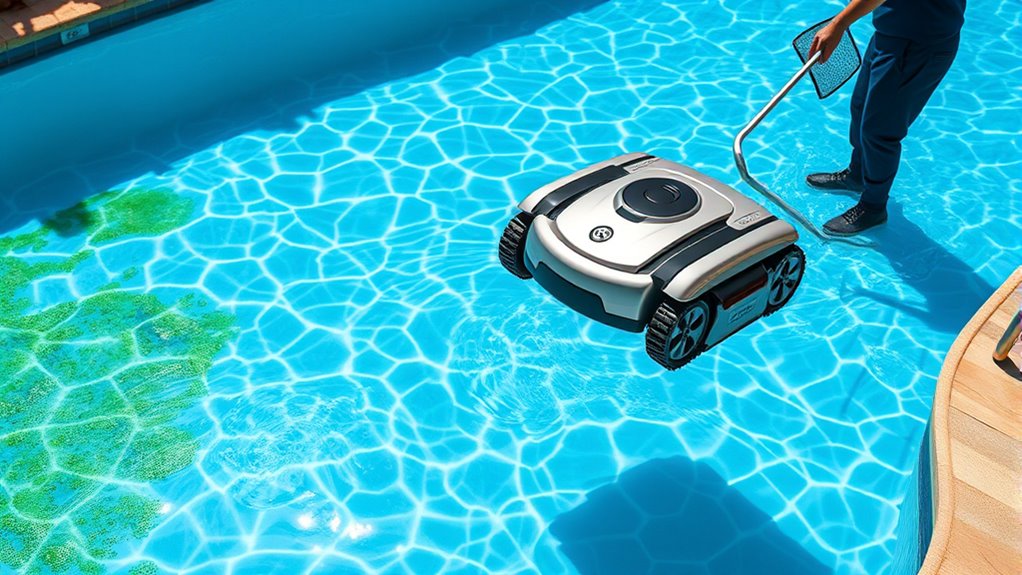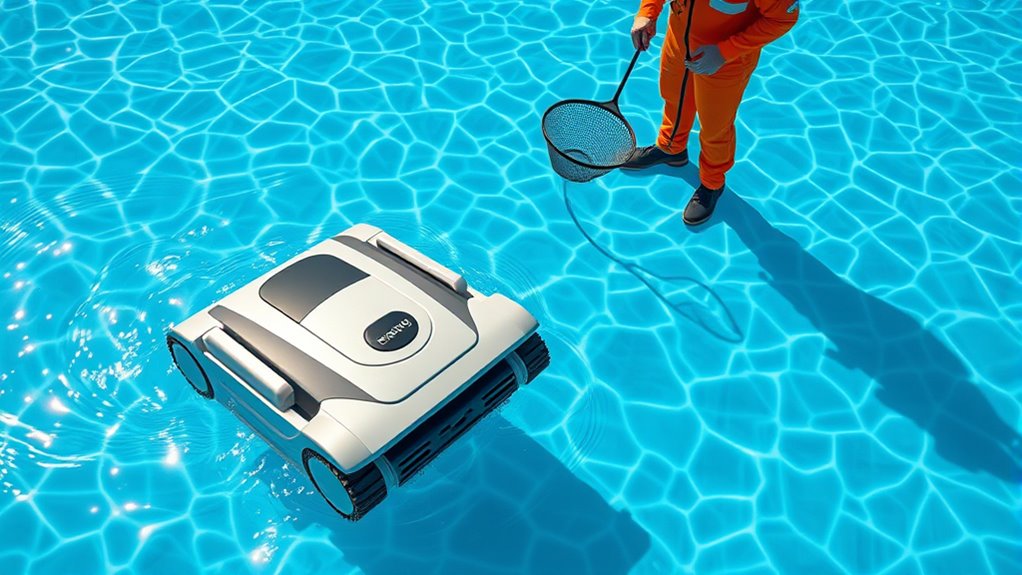Choosing between a robotic pool cleaner and hiring a pool service depends on your budget, pool size, and maintenance preferences. Robotic cleaners are automated, energy-efficient, and often more cost-effective over time, perfect for regular upkeep. Professional services guarantee thorough cleaning and chemical balance but come with ongoing costs and environmental impact. To discover which option suits your needs best and how each handles different pools, keep exploring the details below.
Key Takeaways
- Robotic cleaners operate independently and require minimal human intervention, while pool services involve regular professional visits.
- Robotic cleaners have higher initial costs but lower ongoing expenses compared to recurring professional service fees.
- They are energy-efficient, using low-voltage motors and scheduled operation, reducing environmental impact.
- Pool services provide comprehensive cleaning, chemical balancing, and maintenance, often covering complex pool shapes better.
- The choice depends on budget, pool size, shape, and desired level of automation and maintenance convenience.

When it comes to maintaining your pool, you have two main options: investing in a robotic pool cleaner or hiring a professional pool service. Deciding between the two depends on various factors, including energy efficiency and cost comparison. A robotic pool cleaner offers an automated solution that can save you time and effort. These devices are designed to navigate your pool independently, scrubbing surfaces and removing debris with minimal human intervention. They tend to be energy-efficient because they operate on low-voltage motors, consuming less power compared to traditional pool pumps used by professional services. Over time, this means lower electricity bills, especially if you run your cleaner regularly. Additionally, robotic cleaners are often equipped with smart navigation systems, which enhance their cleaning efficiency and coverage. Modern robotic pool cleaners increasingly incorporate advanced navigation technology, making them more effective at covering complex pool shapes. This advancement also reduces the likelihood of the device missing areas, ensuring a thorough clean.
On the other hand, hiring a pool service involves a team of professionals who handle everything from cleaning to chemical balancing. While this option guarantees thorough maintenance, it can be more costly in terms of ongoing expenses. Professional services typically include the use of powerful, dedicated pool equipment that might consume more energy, but they also offer all-encompassing care that robotic cleaners can’t always provide. When comparing costs, a robotic cleaner requires an upfront investment, which can range from a few hundred to over a thousand dollars, depending on the features. Once purchased, maintenance costs are relatively low, mainly involving occasional repairs or replacement parts. In contrast, a pool service usually involves recurring fees—weekly or bi-weekly—that can add up notably over time. These fees include labor, chemicals, and equipment use, which can quickly surpass the one-time cost of a robotic cleaner.
In terms of energy efficiency, robotic cleaners are generally more eco-friendly since they use less power and require less water. They also operate on scheduled timers, allowing you to optimize usage during off-peak hours, further reducing energy consumption. Conversely, professional pool services often rely on larger, energy-intensive equipment for cleaning and water treatment. While they provide convenience and all-encompassing maintenance, their energy footprint can be larger. Additionally, advances in home appliance technology have made robotic cleaners increasingly sophisticated and capable of handling complex pool cleaning tasks with minimal supervision. This technological evolution is making robotic cleaners a more viable option for many pool owners seeking sustainable solutions. Furthermore, choosing a robotic cleaner can help reduce your carbon footprint, contributing to a more environmentally friendly pool maintenance routine.
Choosing the right solution may also depend on your pool’s size and shape, as some robotic models are better suited for certain configurations. Ultimately, your choice hinges on your budget, the size of your pool, and how much time you’re willing to spend on maintenance. If you’re looking for a cost-effective, energy-efficient solution that requires minimal ongoing expense and effort, a robotic pool cleaner is a smart investment. However, if you prefer hands-off, professional-grade care, hiring a pool service might be worth the additional cost, especially for larger or more complex pools. Weighing the energy efficiency and cost comparison of each option helps you make an informed decision tailored to your pool maintenance needs.
Frequently Asked Questions
What Is the Typical Lifespan of a Robotic Pool Cleaner?
The typical lifespan of a robotic pool cleaner is around 5 to 8 years, depending on how well you maintain it. To maximize its longevity, you should keep up with regular pool maintenance and cleaning frequency, such as cleaning filters and removing debris. Proper care guarantees your robotic cleaner functions efficiently and lasts longer, saving you money and effort in the long run.
How Energy-Efficient Are Robotic Pool Cleaners Compared to Manual Cleaning?
Robotic pool cleaners are generally more energy-efficient than manual cleaning methods. They consume less energy due to optimized motors and precise navigation, making the efficiency comparison favorable. You’ll notice lower energy consumption with robotic cleaners because they target dirt more effectively and don’t require continuous operation like manual skimming or vacuuming. This means you save on electricity while keeping your pool cleaner and clearer, ultimately making robotic cleaners a smart, eco-friendly choice.
Can Robotic Pool Cleaners Handle Large Debris or Only Small Particles?
Is your pool a battlefield of large debris or just tiny particles? Robotic pool cleaners excel at particle filtration, capturing small dirt and algae with ease. However, they often struggle with large debris like leaves and twigs, which can clog their filters or get stuck. For thorough cleaning, consider combining a robotic cleaner’s efficiency with manual removal of large debris for a sparkling, well-maintained pool.
What Is the Average Cost Difference Between Buying a Robotic Cleaner and Hiring a Service?
You’re curious about the cost comparison between buying a robotic pool cleaner and hiring a pool service. Typically, purchasing a robotic cleaner costs between $500 and $1,500 upfront, with maintenance expenses adding to that over time. In contrast, hiring a pool service usually costs around $80 to $150 per visit, with monthly expenses ranging from $100 to $300. Consider your budget and maintenance needs to choose the best option.
Do Robotic Pool Cleaners Require Professional Installation or Setup?
Think of setting up a robotic pool cleaner like assembling a new piece of furniture; it’s usually straightforward. Most models feature user-friendly designs and simple installation steps, so you often won’t need professional help. While some high-end models might require a bit more setup, generally, installation complexity is low, making it easy for you to start cleaning your pool without hassle.
Conclusion
Ultimately, choosing between a robotic pool cleaner and hiring a pool service depends on your needs and budget. While a robotic cleaner may save you time and effort, professional service offers peace of mind and thorough cleaning. Remember, you get what you pay for—cutting corners might save money now but could cost more later. Sometimes, investing in quality means the difference between a sparkling pool and a muddy mess. Choose wisely and enjoy a pristine swimming experience.









